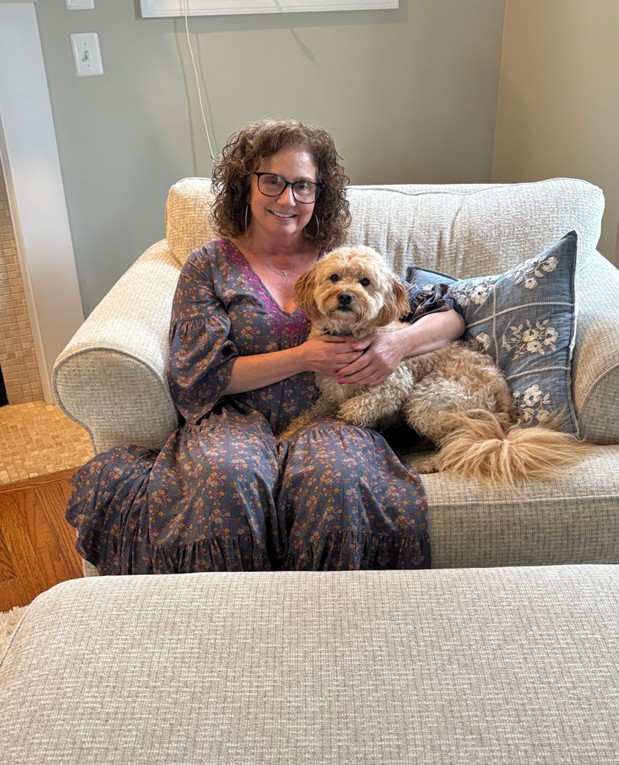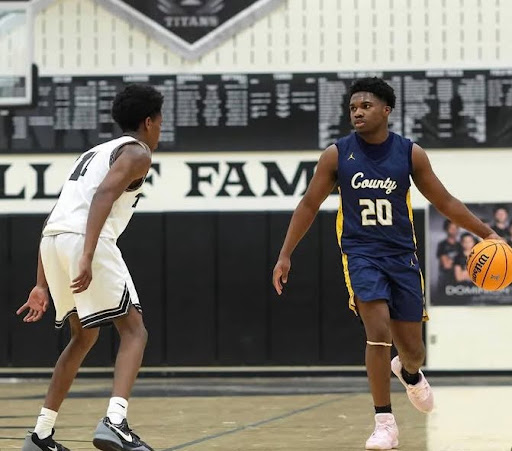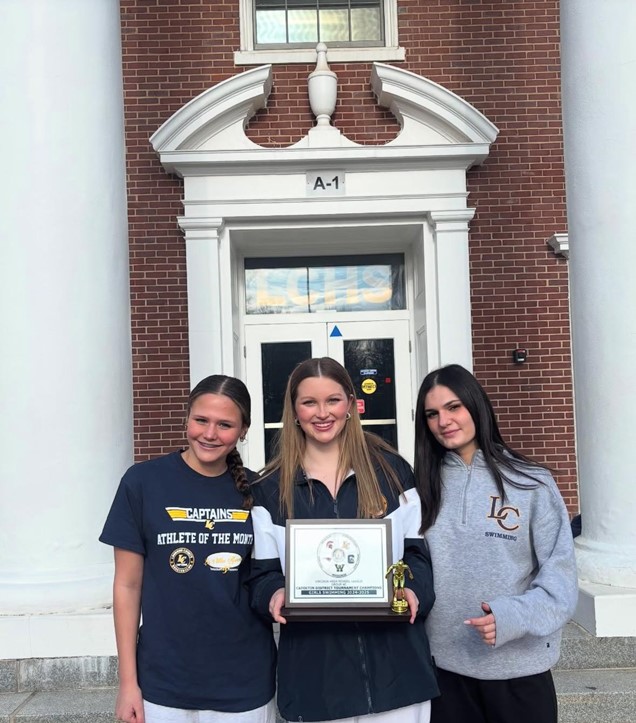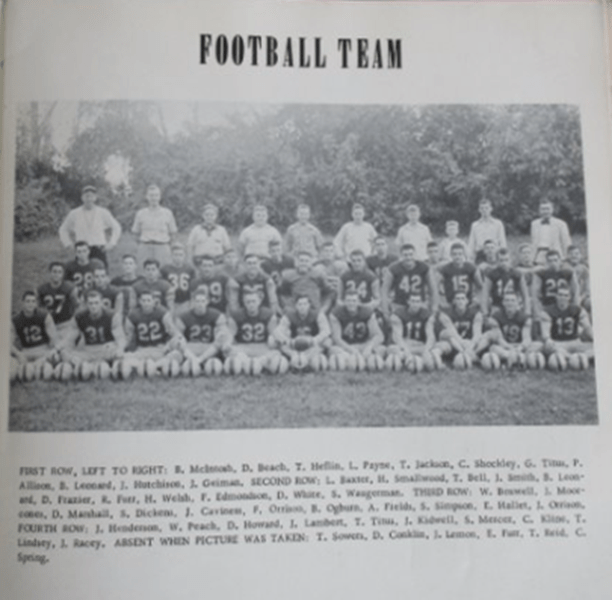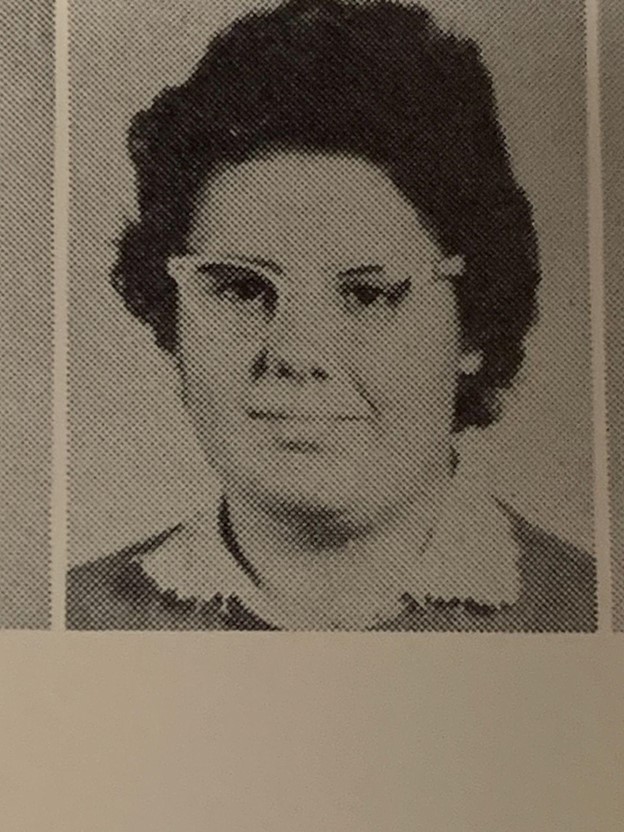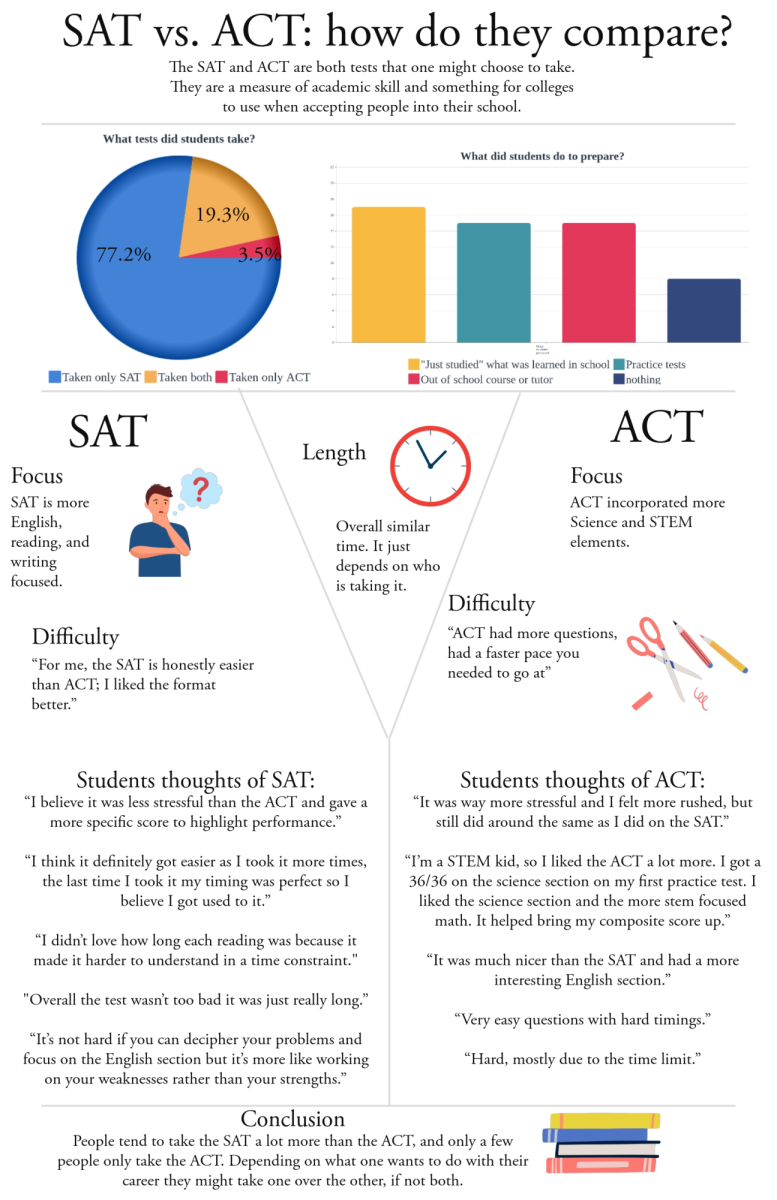Alice In Wonderland – Behind the Scenes
Drama Department Brings Life to Alice in Wonderland
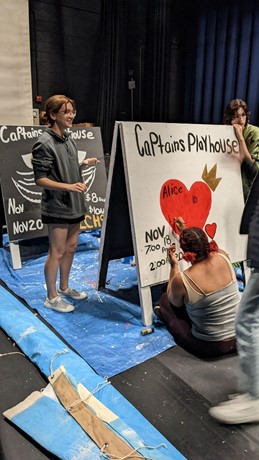
Kat Blackwood (left), Jada Venson (middle), and Maxwell McKnight, work backstage to create the advertisement signs for “Alice in Wonderland”
Nervous laughter, shouted questions, and friendly chatter echo within the small hallway containing the collection of theater rooms to the left of the stage.
A stagehand, clad in black, alerts the hallway, only 20 minutes left. 20 minutes until the debut of what many have been dedicating all their extra time to in the weeks leading up to the play.
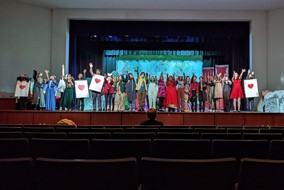
More than 55 students have been ramping up their commitment each week until in the last days before opening, three to four hour rehearsals three times a week were adding up to 12 hours spent perfecting their performance.
Director Nathan McGraw says that preparations for the play have been taking place for about five months. “Starting from the end of last year, to casting the show in September,” McGraw said.

As the students got ready to rehearse on set, McGraw made final preparations for the play. According to Evie Holmberg, a senior and soldier in the play, the script had “been bubbling in the director’s mind since the beginning of the school year,’’ as they had modified certain aspects of the adaptation, written by Anne Coulter Martens, to add the theater department’s unique flair to the production.
“The thing about scripts is we can only change so much, so really it’s about the execution of certain scenes, like towards the end of the play where someone shows up with a leaf blower, and that’s not written into the script at all but it adds to the scene,” McGraw said.
Falling through the rabbit hole, chasing after the iconic white rabbit, the play pairs the Cheshire Cat and Alice, as Alice explores the weird and wacky world of Wonderland. Shortened to fit about an hour run time, the play features such iconic scenes and characters as the caterpillar in his den, the Mad Hatter at his tea party and the Queen of Hearts winning croquet.
With each scene pairing the classic and contemporary, the student input and collaboration in the production was palpable in all facets.
“I absolutely think we’ve had a lot of support from the students for putting this together. We’ve had a lot of people who have stepped up to the challenge of putting on a large scale production,” McGraw said. “It’s just seeing how everyone in the cast has been developing their character, and all the little quirks and ticks and what they’ve been doing to make the characters their own, it’s been satisfying to watch them.”
Each student had their own methods for preparing for their role.
“I memorize the lines as soon as I get the script, ” Maxwell McKnight, senior and Mad Hatter in the play, said. “That’s why it is so much easier for me to get into character, especially with such a big character as the Mad Hatter is and I just live at rehearsal in the attitude that the Hatter has, that’s how I get ready.”
Beyond individual student’s methods for preparation, each rehearsal gives an opportunity for more practice and to learn how all the characters can work together, to create a cohesive show.
From around 4:30 the students begin preparing the set pieces and lighting for a run through, then on costumed run throughs get into costume, before practicing either parts, or later in the progression, the full play. The director would either pause the performance to give notes or give notes at the end of the performance, directing students on how to improve their performance.
These practices run from two to later, up to four hours, which can predictably add stress to the student participants.
“I have a lot of work to do for my classes so it’s hard to balance academics and theater,” Kat Blackwood, senior and Cheshire Cat, said.
“Alice in Wonderland, we are all big characters, since it is supposed to be a Wonderland, so we have to really pump up our energy, and that can be really exhausting,” Maxwell said, “We have to show that 100 so we can be ready for 1000 for the show.”
Furthermore, while on paper students only spend rehearsal times, there is often extra preparation to be made, to which theater students pick up the slack.
“By a technicality I spend two hours, but it depends because I sometimes stay longer.” Maxwell said.
The exhaustion is often palpable in the air, tired sighs and pleas for snacks reverberate through the auditorium, students moving with leaden steps to put away whatever supplies they must before heading home.
The next day after school, students navigated gingerly over twisting cords laid behind the set in order to fulfill last minute adjustments in the coordinated chaos.
Ally Donnelly, Lead Programmer, Lexi Donnelly, Co-lighting Designer, and Sydney Shcaefer, Co-Lighting Designer and Booth Stage Manager are some of the people making last minute requests
The lighting was undertaken at the beginning of the year, as they began organizing and planning for the rest of the year. Loudoun County High School has better access to lighting than previous years, but lack of some supplies accessible to other schools still causes difficulties for the team.
“We don’t have the funding to buy what most other schools can,” Schafer said.
Due to the range of other extracurricular activities that LCHS supports, many of which compete for national and state titles, such as Volleyball and Marching Band, funding is spread thin; a problem exacerbated by the unstable leadership of the Theater Department for the last several years and the expected reliance of the Theater Department on the money earned from ticket sales .
The tech leads work overtime to make up for any gaps in funding.
“We have tech rehearsals for tech leads, which are the heads of their departments, once a week until around 6:30 on Tuesdays,” Ally Donnelly said.
“We would always go over, though,” added Schaefer, saying they often went up to an hour over.
Tech rehearsals happen once a week throughout the year until “tech integrations” when the lighting, sound design, and any other technical aspects are integrated into the show, to properly work with the actors’ performance.
Tech integration began at the start of November, as Ally Donnelly said “and it’s going to be more and more time until the show, until we are here every day.”
The tech team also attends Saturday rehearsals, which last around four hours.
Moving from last year’s lows with a chaotic switching of directors, resulting in little guidance for the tech team, the team views this year as much better, with the help of their technical director.
“It was really hard to get a solid plan down, especially for the tech people because we all have to work together,” Lexi Donnelly said.
Last year, however, did bring a shipment of LED lights and moving lights, which the team was excited to utilize for a more composed performance.
“We could do a lot more stuff than we’ve ever been able to do before, so we got to try lots of new things,” Ally Donnelly said in regards to the lights.
Sydney Schaefer expressed appreciation of getting official titles, and this year even more new supplies.
Moving from the intricate electrical gear for lighting, the smell of paint and wood-dust hits me, as I walk into the hallway.
The Queen of Hearts, Jada Venson, also worked as assistant set designer, her first year in the role.
“I started designing, before I got assistant set design, I was showing Mr. McGraw ideas I had for the set, which is what interested me into interviewing for set design,”
Like the rest of the play, concepts for the set had been being worked on for a long time.
“I think September 8th is when I started designing, and got everything up around October 19th. Then a lot of our stuff was just painting everything and making it colorful.”
Set design was able to complete a lot of the work on designated tech days, although Venson also spent tech classes and some of her time as a teachers assistant in Drama I, completing work on sets.
Venson worked almost solely as a leader on set as she said, “I believe I got assigned around seven people, but no one really started, so it’s kind of whoever was there and whoever I could tell to do something.”
The set crew tried to keep costs low, to stay on budget.
“We did buy a lot of our paints and a couple bits of wood, but for the most part our shop, though it is bad wood, we do have wood enough to do what we need, so we kind of just work off what we have,” Venson said.
Despite budgeting, a variety of other issues have impeded the drama departments.
“I would say making sure everyone is focused, and everyone is on task, and everyone has their lines memorized, which is a common thing with each production,” McGraw said, on what he has found to be the biggest issues faced.
Senior Kiley Byers, who played Alice, agrees, noting that “Memorization, people learning their blocking, and learning their lines, especially for me since I’m in every scene and often go back and forth.” are some of the largest difficulties.
Staff and student absences due to overlapping events and sickness were also a regular issue.
“I think that our biggest thing is administration getting some things mixed up where we were supposed to be on the stage but we had to be in the black box, I think that was probably our biggest struggle, school wide challenges,” Chianti Moorman, assistant director, said.
Moorman also said keeping the students on task while acting was important.
“I just really do want them to have fun, but I just want them to put on the best production possible, so I do play bad cop a lot, but that’s because I know their potential, I know that they are not giving their all.”
But beyond any of the struggles faced, it’s clear the theater department’s enthusiasm and community overcome any hurdle.
“I feel like it’s a lot of fun, I’m having a great time, and I really like the show,” Blackwood said. “I think that theater is a community with a lot of friendly, nice people, so I think I have a lot of friends here.”
“The people are really great, they are nice and funny, they’re dope,” junior Daniellah Etisi, who played Duchess, said, “I’m a true theater kid at heart.”
“I’m fully optimistic,” McKnight said. “The show is going really well and I’m really happy with the effort going in, and I think we have a lot of wonderful characters for the people that watch.”
Your donation will support the student journalists of Loudoun County High School. Your contribution will allow us to purchase equipment and continue to print our issues for the students at our school.

Editor-in-chief Liberty Harrison is a senior at LCHS. This is her third year working on the newspaper staff. She would like to one day be an investigative...




